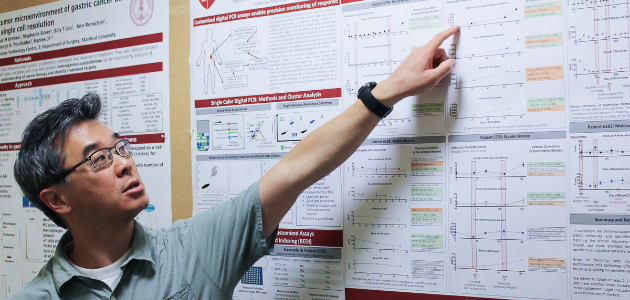Gastric Cancer Registry Data Leads to New Discoveries
Data from the Gastric Cancer Registry at Stanford University Medical Center has led to important new discoveries, according to primary investigator Hanlee Ji, MD, Professor of Medicine at Stanford. Ji reports that the registry’s research team has discovered a specific error in the genetic code of gastric cancers that indicates why some stomach cancers may respond to immune-based therapies while others do not. In another recent study, the team used registry samples to identify a potential new immunotherapy combination which may have improved responses.
The registry team is now leveraging the newest molecular technologies to provide even more valuable information. This includes an approach called “spatial analysis” – a cutting-edge tool which enables scientists to characterize the different biological cells within a patient’s tumor. This type of analysis reveals how tumor cells “talk” to the surrounding stomach tissue and change adjacent tissues to support cancer growth. This work will lead to the identification of additional new therapeutic targets.
The Gastric Cancer Foundation launched the Gastric Cancer Registry in 2011 to enable greater scientific research into the causes of stomach cancer and the potential for more effective therapies. Patients who enroll in the registry provide basic medical information about their cancers and contribute biopsy material from their tumors whenever possible. The team of cancer researchers applies cutting-edge technologies to these samples, identifying important molecular features that reveal how these stomach cancers start, as well as information that could point to potential new treatments.
The Gastric Cancer Registry has a special role among cancer registries because it makes complex molecular information accessible free of charge to all researchers through the GCR Genome Explorer. In fact, the Genome Explorer is available to anyone who is interested in studying the molecular features of gastric cancer.
To date, 655 individuals have directly enrolled in the registry and additional samples have been obtained through domestic and international collaborations. For example, the Guatemala Integra Cancer Institute provided a large cohort of samples. While gastric cancer occurs with alarming frequency among individuals from Latin America, these patients are frequently underrepresented in current gastric cancer databases. Registry researchers are now investigating how these patients’ tumors differ from others, with the intent of determining how they may be better treated.
Ji emphasized how much the participation of gastric cancer patients contributes to continued progress. All patients are urged to complete online enrollment. Staff is available to assist and answer questions.
Ji expressed his appreciation for the Gastric Cancer Foundation’s partnership and dedication to this work. “Funding from the Gastric Cancer Foundation initially created the Registry,” says Ji, “and their continued support enables us to grow the scope and impact of our work.”

